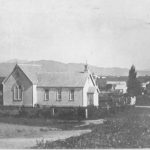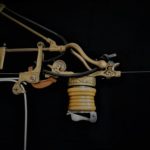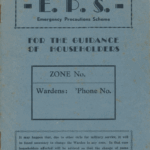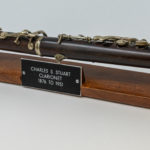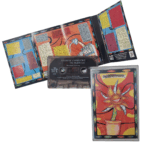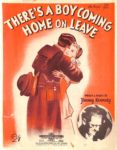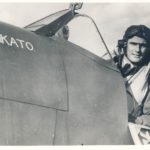Who was “the Duchess” of Cambridge?
Image: Left – Stuart Newall’s house and former Post Office. Centre – Wesleyan Chapel. Right – the rear of the Duke of Cambridge Hotel. Background Pukekura and Maungatautari Part 1 – A question New Zealand…
Read MoreKāheru (spade)
This kāheru (also spelled kaaheru) is a traditional Māori gardening spade, likely used for light agricultural work such as turning soil in preparation for planting kūmara. Kūmara, also known today as sweet potato, was a…
Read MoreWedding Dress, 1877
What were Marion Whitelaw Crickett’s thoughts in August 1877 as she walked down the aisle in this beautifully tailored wedding gown? She was about to marry Pukerimu farmer Robert Fisher, who was well on his…
Read MoreCalvert’s Cash Carrier
Every town has its signature store, and for Cambridge it was Calvert’s. Buttons, bows, material, menswear, frocks, furniture, curtains, carpets – it was all there. If you were coming to Cambridge to shop, you almost…
Read More“Don’t Panic”: Wartime Emergency Booklet
As fears of Japanese invasion gripped New Zealand in March 1942, every household in Cambridge received a copy of The Emergency Precautions Scheme (EPS) for the Guidance of Householders—a wartime civil defence guide designed to…
Read MoreCharles Stuart’s Clarionet
Cambridge’s Alexandra Hall was alive with music, colour and movement in September 1903. Between 50 and 60 “splendidly attired” couples graced the floor for a grand fancy dress ball. The Waikato Times reported that the…
Read MoreThe Wallflower Audio Tape
The Wallflower is best described as an electronic, country, sci-fi concept album, a fever-dream satire about teenage angst that blurs the lines between music, cinema, and storytelling. Conceived by Andrew Johnstone and produced by…
Read MoreHorahora Hydroelectric Power Station
Shipwreck Secrets Uncovered Last Friday, maritime archaeologist Matthew Gainsford gave a talk that took us on the final voyage of the HMS Buffalo. The vessel, once a timber carrier, quarantine and immigrant ship, now lies…
Read MoreDoing Your Bit – The Home Front in WWII
When the Second World War began in September 1939, around 5000 people lived in Cambridge and surrounding villages. Over the next six years, nearly 500 left for overseas service. The family and friends who remained…
Read MoreOf Spitfires and Cock Pheasants
Flight Lieutenant E. P. ‘Hawkeye’ Wells In the cockpit of the Subscription Spitfire, ‘Waikato’. Donations from the provinces of New Zealand in 1941 supported the purchase of new Mk V cannon-firing Spitfires for No. 485…
Read More
